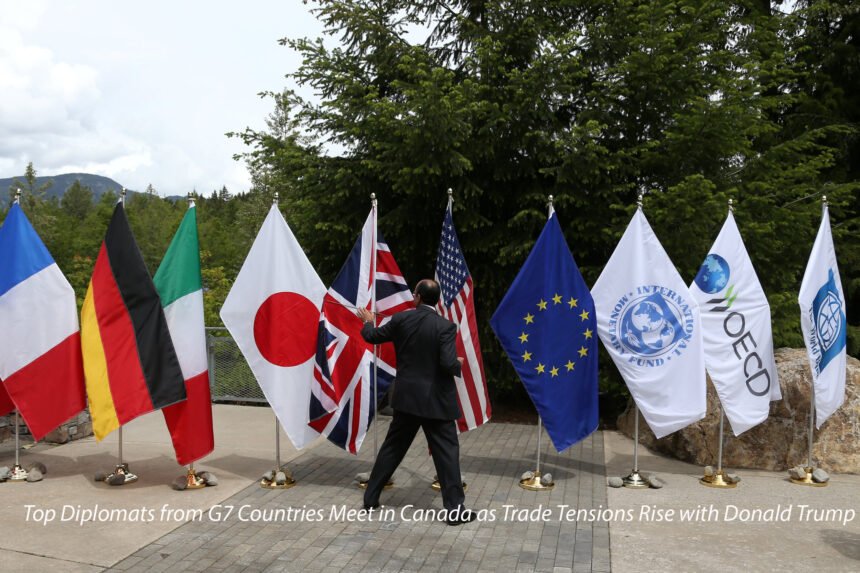As global trade tensions escalate, top diplomats from the Group of Seven (G7) countries convened in Canada this week to discuss the growing strain between the United States and its allies. The gathering, held in the coastal province of Newfoundland and Labrador, served as both a forum for cooperation and a reflection of deep unease over recent economic policies pushed by former U.S. President Donald Trump.
A Meeting Amid Uncertainty
Foreign ministers from Canada, the United Kingdom, France, Germany, Italy, Japan, and the United States gathered to address mounting trade disputes and geopolitical instability. The meeting came as Trump intensified his rhetoric over tariffs and trade deals, reigniting concerns about protectionism and the future of multilateral cooperation. Sources close to the talks revealed that the G7 ministers aimed to restore confidence in open markets and rules-based trade.
Canada’s foreign minister opened the meeting by emphasizing the importance of unity in confronting economic nationalism and defending global stability. The tone, however, reflected a mix of cooperation and caution, with diplomats acknowledging the complex challenge of engaging with a U.S. leader who often criticized international institutions.
Rising Trade Tensions with Washington
Tensions between the United States and other G7 members have been brewing for months. Donald Trump administration repeatedly challenged long-standing trade agreements, including those with European and North American allies. The former president’s push for higher tariffs on imported goods, coupled with his criticism of organizations like the World Trade Organization, has strained diplomatic relations.
European diplomats expressed concern that Donald Trump policies could trigger a new wave of trade disputes, particularly in the automotive and technology sectors. Japan’s foreign minister emphasized the importance of “balanced and predictable trade policies” to maintain global supply chains and mitigate economic shocks.
For Canada, which hosted the meeting, the stakes were high. Its economy remains deeply tied to U.S. trade flows, and any further escalation could disrupt key industries such as manufacturing and energy. Canadian officials emphasized that dialogue and diplomacy were the most effective tools for preventing a slide into trade wars.
Efforts to Rebuild Trust
Despite the tension, G7 diplomats sought to project unity on broader issues, including climate change, human rights, and global security. They reaffirmed commitments to support Ukraine amid its ongoing conflict and to strengthen cooperation in the Indo-Pacific region, where China’s growing influence continues to reshape geopolitical dynamics.
The discussions also touched on artificial intelligence and cybersecurity, as the ministers recognized the increasing role of technology in global power competition. Officials agreed that economic disagreements should not overshadow the need for collaboration in addressing global crises.
Still, several European representatives privately admitted that rebuilding trust with Washington would take time. While the Biden administration had attempted to repair ties with U.S. allies after Trump’s term, Donald Trump renewed political influence has raised fears of future policy reversals.
Looking Ahead
As the meeting concluded, diplomats issued a joint statement calling for continued cooperation and “mutual respect in addressing economic and political challenges.” They urged all members, including the United States, to uphold international trade norms and avoid measures that could destabilize global markets.
Observers noted that while the G7 remains a powerful platform for dialogue, its cohesion faces tests from within. The shifting political landscape in the United States, combined with rising populism in Europe, has made consensus harder to achieve.
In the coming months, G7 leaders are expected to reconvene for a summit focused on trade reform, digital regulation, and global development. For now, the meeting in Canada served as a reminder that even among allies, diplomacy is an ongoing balancing act, one shaped as much by trust as by national interest.
At a time when economic uncertainty looms large, the G7’s effort to maintain open dialogue offers a glimmer of stability. Yet the question remains: can the world’s leading democracies stay united in the face of growing division and protectionist impulses? The answer, as the meeting revealed, will depend largely on whether cooperation can triumph over confrontation in the years ahead.












